


It is forbidden to burn the fats of blemished animals on the altar.
This mitzvah forbids burning the sacrificial fats (cheilev) of blemished animals upon the Mizbeach. The burning of fats and certain parts of the korban is a central ritual act meant to honor Hashem. Performing this service with a blemished animal undermines the sanctity of the avodah and profanes the altar.
Rambam explains that the Torah created four distinct prohibitions concerning blemished animals: consecrating them (337), slaughtering them (338), sprinkling their blood (339), and burning their fats (340). Each stage of sacrificial service must be preserved in holiness, with the Torah teaching that imperfection is unacceptable at any step.
Sefer HaChinuch emphasizes that Hashem’s service must radiate reverence and respect; burning the fats of unfit animals profanes His honor rather than sanctifying it. The Talmud clarifies that this act carries liability because burning on the altar is considered one of the most significant acts of avodah. Ramban teaches that this mitzvah instills a lesson: only offerings that reflect completeness and dignity are acceptable before Hashem.
Commentary & Classical Explanation:


Represents the concept of spiritual intentionality, purity, and sanctity—set apart for a higher purpose.
Concerns the Beit HaMikdash, korbanot (offerings), and priestly service.
Signifies awe and reverence toward Hashem—living with awareness of His greatness and presence.
Mitzvot that uphold fairness, honesty, and moral responsibility. Justice is kindness structured — ensuring that society reflects G-d’s order through truth, equity, and accountability.
Mitzvot that define and deepen the relationship between a person and their Creator. These include commandments involving belief, prayer, Shabbat, festivals, sacrifices, and personal holiness — expressions of devotion rooted in divine connection.

Dive into mitzvos, prayer, and Torah study—each section curated to help you learn, reflect, and live with intention. New insights are added regularly, creating an evolving space for spiritual growth.

Explore the 613 mitzvos and uncover the meaning behind each one. Discover practical ways to integrate them into your daily life with insights, sources, and guided reflection.

Learn the structure, depth, and spiritual intent behind Jewish prayer. Dive into morning blessings, Shema, Amidah, and more—with tools to enrich your daily connection.

Each week’s parsha offers timeless wisdom and modern relevance. Explore summaries, key themes, and mitzvah connections to deepen your understanding of the Torah cycle.